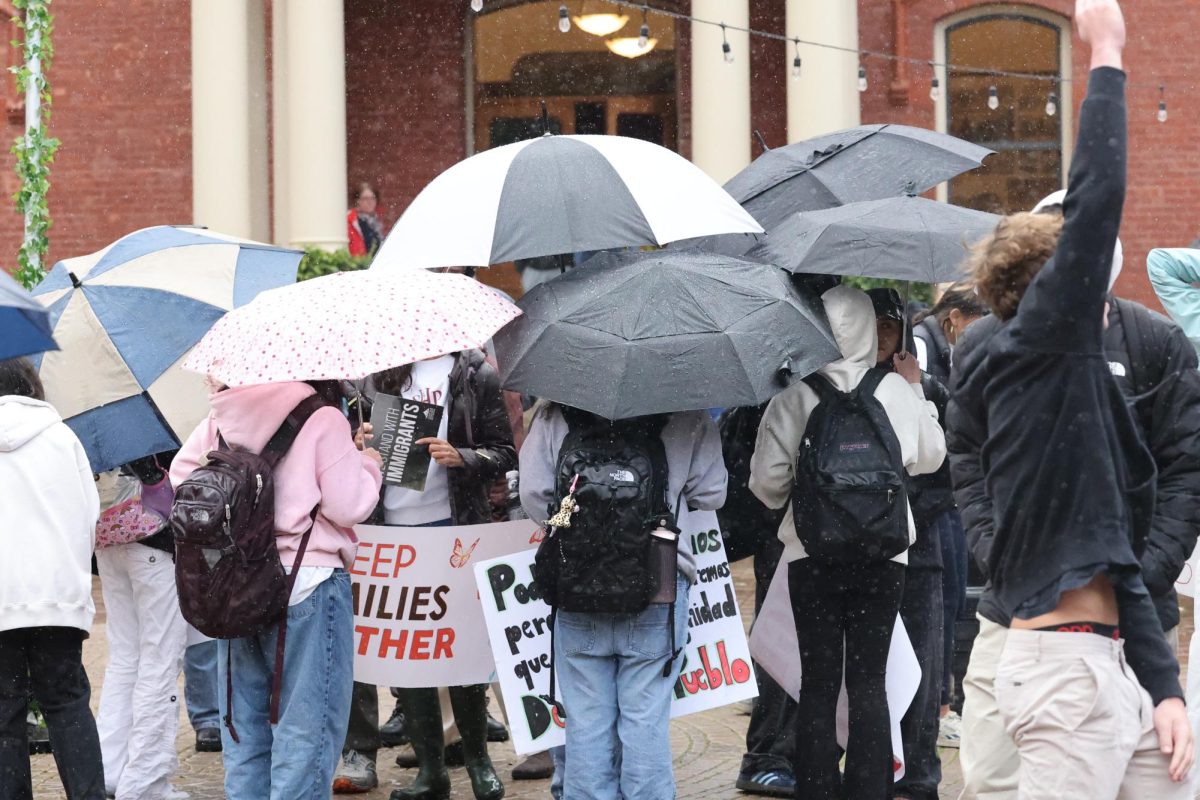In the past decade, the presence of contentious speakers on school campuses has impacted universities across the country, two prime examples being talks given by Josh Blackman at CUNY and Ann Coulter at UC Berkeley. Recently, on March 9th, 2023, 5th U.S. Circuit Judge, Stuart Kyle Duncan, was targeted by a group of seventy students while speaking at the Federalist Society event at Stanford Law School. According to Reuters, several students as well as the school’s Dean of Diversity, Equity, and Inclusion, believed Duncan “threatened the rights of LGBTQ people, immigrants, Black voters, women and others.” However, their brash reaction, including derogatory comments about his wife, unrelenting shouting, and inappropriate signs, was considered extremely disrespectful by Judge Duncan and the leaders of the Federalist Society. In the end he was effectively prohibited from speaking. This occurrence once again raised the question of whether or not controversial speakers should be granted a platform at educational institutions. While the major headlines tied to this issue have been predominantly at college campuses, similar issues have also transpired at high school campuses, including Sacred Heart Prep.
In early September, Morgonn McMichael was invited to the Sacred Heart Campus by the Prep’s chapter of Turning Point USA, an American nonprofit “whose mission is to identify, educate, train, and organize students to promote freedom.” McMichael, a contributor at Turning Point, was invited to speak at SHP about her experience as a conservative woman in high school. However, McMichael has a very active X (the platform formerly known as Twitter) profile, on which she has published content that many perceive as homophobic and transphobic; for instance, in one of her recent tweets she claimed “Target hired a satanic Artist for their PRIDE collection.” In these past few weeks, her invitation was a major topic of conversation for many students on campus; some were hesitant about welcoming her, and others were put off by her views entirely. Suddenly, the question of whether or not controversial speakers should be allowed on an academic campus–ours in particular–became extremely relevant.
However, in order to answer this question, one must first define what makes a speaker controversial. SHP, like any other academic institution, has a student body with diverse perspectives and political affiliations. What’s controversial for some might not be for others. Additionally, excluding certain viewpoints from campus is likely preventing some students from seeing their beliefs represented in a public space.
Nonetheless, while there is no singular set of political beliefs on campus, Sacred Heart is still centered around the school’s Mission. As the Goals and Criteria encompass the values of Sacred Heart, it is imperative that they serve as a tool for determining whether or not an outside speaker is in line with the school’s Mission. However, while the Goals and Criteria of Sacred Heart do promote a specific set of principles, they are not designed to exclude any belief systems. In fact, the second Criterion of Goal Three asks that Sacred Heart “immerse students in diverse global perspectives” in order to develop “competencies such as critical consciousness, language facility and cultural literacy.” Following the Mission statement involves creating a wider diversity of thought so that students may grow into their own beliefs. Further, the Assistant Principal of Community Life, Matthew Montenegro (Monte), believes that within “our Mission…there can be dissension, and [his] job is to create spaces for [the students] to form [their] opinions, not to present just one opinion.” Censoring speakers on campus creates an environment where some beliefs are promoted over others, skewing students towards a specific view. As Monte puts it, it is the school’s job to “provide the space for possibility, rather than putting together an agenda or a particular set of beliefs.”
Moreover, limiting diversity of thought does additional harm by inadequately preparing students for the political diversity in the world. At some point in everyone’s life, they encounter dissenting viewpoints, and it is important that students have the skills to be open-minded. Monte shared that it is within the school’s Mission to teach students to “invite people into conversation and have the opportunity for discourse,” even if “you are delivering something that others might not agree with.” Learning to be in conversation with people you actively disagree with is best suited for a safe school environment, where there are resources available to assist students. Excluding certain speakers and viewpoints from campus can create an artificial environment, in which students are unable to engage a full spectrum of opinion. For high school students, this is especially important because we are still developing our belief systems. It is essential for us to learn how to engage civilly with opinions we don’t agree with.
This article does not, by any means, condone insensitive posts, like those of Morgonn McMichael, which actively cause harm, or argue that SHP should have welcomed her. Still, moving forward, it is important to recognize the value of dissenting opinions in representing the varying perspectives at Sacred Heart, allowing students to explore their own beliefs, and preparing students to handle opposing viewpoints in the world.
Brooke Soderbery ‘26
Debates about whether controversial speakers should be allowed to speak on college campuses have become increasingly common. While less prevalent at high schools, such conversations recently emerged at SHP when the speaker Morgonn McMichael was invited to SHP by the Turning Point USA (TPUSA) club but her visit was not approved by the administration. Morgonn McMicheal is a conservative influencer affiliated with TPUSA, an organization created by Charlie Kirk which self-describes as a “non-profit… whose mission is to identify, educate, train, and organize students to promote freedom” on its website. McMicheal posts videos on TikTok, Instagram, and Facebook in addition to making appearances on conservative news sites such as Newsmax, Real America’s Voice, OAN, Brietbart. TPUSA claims to be the largest growing student organization in the United States, with over 3500 chapters. It gained infamy from its controversial watchlist of professors deemed to promote leftist propaganda as well as for its ties to far-right individuals such as Candace Owens and Milo Yiannopolous.
This controversy surrounding speakers on campus naturally leads to two questions: Can schools restrict freedom and diversity of speech on campus? Should schools restrict freedom of speech on campus? The former has a fairly simple answer, at least for federally-funded schools. If an institution, whether at the high school or college level, receives any federal funding, it must abide by constitutional holdings relating to student’s rights. Virtually all elite universities receive some amount of federal funding or grants, so these holdings apply to them. The most significant holding relating to these rights is Tinker v. Des Moines (1969), which set the precedent that students maintain their First Amendment rights from the moment they enter the school grounds, with the exception of when student speech disrupts the learning environment. This precedent was upheld and built upon in Mahanoy Area School District v. B.L. (2021), after a female student, who was punished by her school for inflammatory comments on her Snapchat story, sued the district for violating her First Amendment rights. The court ruled in favor of the student, protecting, in this instance, off-campus student speech, including on social media.These precedents compel public institutions to allow student-invited speakers onto campus unless there is a threat of violence or discrimination or if the speaker disrupts the learning environment.
However, these holdings do not apply to private institutions like Sacred Heart, which is an independent, non-parochial school that is mission-driven. Therefore our guidelines depend upon our mission, not the government. By signing the SHP Family Handbook, students agree to abide by the SHP Mission and policies of the Sacred Heart. Because SHP is an independent Catholic institution, the school has the authority to discern whether or not any speakers can come to campus based on whether or not the administration thinks they abide by or violate the Mission, Goals and Criteria of the RSCJ.
The Mission and Educational Page of Sacred Heart Atherton’s website states values such as a “committ[ment] to providing an environment where each student is cared for and valued” and “creating an inclusive and caring environment.” Sacred Heart’s Goal IV, the “Building of Community as a Christian value,” specifically lists the criteria to “promot[e] the inherent dignity of the human person and striv[e] for relationships characterized by inclusion and mutual respect.” One aspect of this Goal is to prioritize a healthy community in which all students have their identities respected. While there is certainly merit in welcoming diverse opinions on campus, that same diversity should not undermine the safety of the SHP community. In this context, Sacred Heart should certainly be able to prohibit any discussions that administration deems to violate the human dignity of students.
Sacred Heart not only can refuse to host any voices that violate its community values, but also has a duty to do so. When questioned about this duty, Matthew Montenegro, Assistant Principal of Community Life, spoke about how,while SHP’s role as an educational institute is to “provide spaces for [students] to form [their] own opinions,” the school must also ensure that speakers “center the human dignity of each and every person to make sure that everyone feels respected.” Thus, a line must be drawn between facilitating discussion between different perspectives and infringing on the identities and personhood of students. Specifically, students who frequently encounter discrimination and negative sentiments about their identities should be allowed to exist in a safe space at Sacred Heart, not forced to confront bigotry disguised as diverse opinions. While a one-time dialogue with a controversial figure might be considered a “one-and-done” solution, marginalized students–many of whom often have to argue for their identities in every aspect of their lives–may not want to argue for their personhood at their place of education as well. Sacred Heart would not adequately be investing in the wellbeing of students if it allowed a speaker such as McMichael, who responded to a video on X of Russian authorities violently detaining peaceful queer protestors in a van with the comment “Russia handling Tran’s activists the right way” on July 24, 2023. For context, according to Human Rights Watch, within the last three years Russia has banned gay marriage and barred the “public portrayal of ‘non-traditional sexual relations.’” By affirming the actions of Russian authorities in her post, McMichael effectively endorsed violence and discrimination against queer individuals and undermined the protestor’s freedom of expression. Additionally, McMicheal has posted blanket statements such as “Trans women are not women,” and said “Tell me again how the alphabet mafia isn’t a social contagion” in response to a statement about Brown University being reportedly 40% queer. These statements are frank examples of homophobia and transphobia, regurgitating common rhetoric used against queer people surrounding indoctrination and the validity of transgender personhood.
While allowing a speaker on campus doesn’t necessarily mean that a school is endorsing the speaker, Sacred Heart is responsible for the emotional distress students of marginalized identities may experience when they hear that there are outside voices on campus making statements doubting the validity of their personhood and endorsing violence against them due to their identity, such as McMicheal has. At Westminster University, students denied being able to form a safe space on campus due to the presence of a speaker who described homosexuality as criminal and evil. This event demonstrates how discriminatory speakers can have a harmful effect on students and their mental health and thus the need for schools to protect their students. Fundamentally, there is a difference between speakers who discuss policy issues such as taxation, size of government, and individual freedoms that would facilitate healthy discussion about political and economic values, and speakers who discuss topics that dehumanize students on campus. Even if a speaker has posted inflammatory comments online, but does not intend to say those words in their speech, the school still has a duty to make it known to students that SHP is “an inclusive and caring environment” and will abide by the values set out in the Handbook. Additionally, allowing those speakers on campus portrays the image of Sacred Heart as a place that accepts and welcomes hatred against students’ identities, which harms both the perception of the school and could turn prospective marginalized students away from SHP. While students themselves are, of course, allowed to hold diverse opinions, outside figures who have caused tangible harm and made discriminatory statements should not be welcomed with open arms. Diverse discussions are important aspects of education, but should not come at the cost of personhood.







